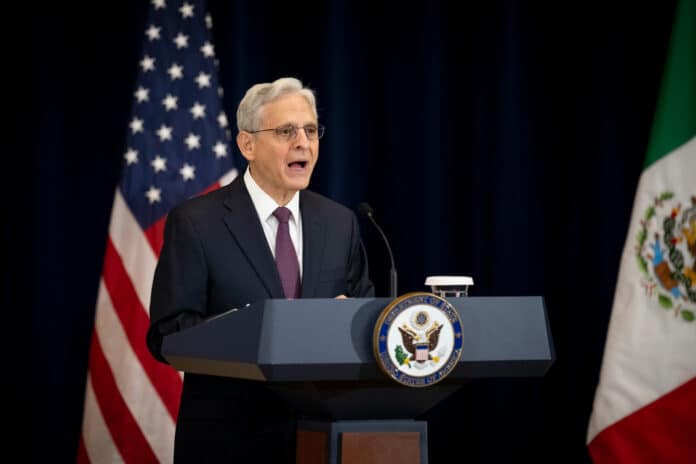
An official from the Department of Justice (DOJ) told House Speaker Mike Johnson (R-La.) in a letter that Attorney General Merrick Garland will not be prosecuted for contempt of Congress because his refusal to hand over audio recordings of President Joe Biden’s interview with a prosecutor did not amount to a crime.
In the letter, which was obtained by several media outlets, the DOJ official said that Mr. Garland’s refusal to comply with a subpoena demanding audio records of an interview that special counsel Robert Hur conducted with President Biden in his investigation into the president’s alleged mishandling of classified documents “did not constitute a crime.”
“Consistent with this longstanding position and uniform practice, the Department has determined that the responses by Attorney General Garland to the subpoenas issued by the Committees did not constitute a crime, and accordingly the Department will not bring the congressional contempt citation before a grand jury or take any other action to prosecute the Attorney General,” Carlos Felipe Uriarte, an assistant attorney general, wrote in the letter.
The letter also cited DOJ policy not to prosecute officials for contempt of Congress when they don’t comply with subpoenas due to a presidential claim of executive privilege.
A request for comment and confirmation of the content of the letter sent to the DOJ was not immediately returned.
More details
The refusal to pursue contempt charges against Mr. Garland comes after the House voted on June 12 to hold him in contempt for failing to comply with the subpoena to turn over the tapes.
The House resolution, which passed in a mostly party-line 216–207 vote, came amid a months-long standoff between Republicans and the DOJ over the production of the audio recordings of President Biden’s two-day interview with the special counsel.
House Republicans have said that they want to obtain the recordings to verify Mr. Hur’s assertions that President Biden couldn’t recollect certain facts during the interview. They have alleged that a two-tiered justice system exists because Mr. Hur opted to not charge President Biden while former President Donald Trump faces multiple charges in connection with his own classified documents probe.
Mr. Hur, who faced criticism from Democrats and the White House for remarks on the president’s cognitive capacity in his report, didn’t recommend charges against President Biden, in part because of his ailing memory.
“At trial, Mr. Biden would likely present himself to a jury, as he did during our interview of him, as a sympathetic, well-meaning, elderly man with a poor memory,” the special counsel wrote in his 388-page report, which found that President Biden “willfully retained and disclosed classified materials” when he was a private citizen after the end of his term as vice president during the Obama administration.
While Republicans have said that they want the tapes to verify Mr. Hur’s assertions, Democrats have argued that Republicans want to use the tapes in campaign ads to portray President Biden as a frail leader with a poor memory who’s too old to serve another term in the Oval Office.
Mr. Hur revealed in testimony before the House Judiciary Committee in March that White House officials sought to soften his report’s characterizations of President Biden’s ailing memory.
Mr. Uriarte’s letter to Mr. Johnson also states that the DOJ made efforts to accommodate Congressional requests for information related to Mr. Hur’s interview of the president, including producing a transcript of the conversation.
The DOJ official also cited a “lack of a sufficient need” for the production of the audio tape of the interview that would “further a legitimate congressional purpose.”
Executive privilege
On May 16, President Biden asserted executive privilege over the interview tapes, with the White House counsel’s office notifying House Republicans of the move just hours before they were expected to recommend holding Mr. Garland in contempt for refusing to hand them over.
Mr. Garland and White House Counsel Ed Siskel defended the executive privilege assertion as necessary because it could affect future investigations.
In a May 15 letter to the president, Mr. Garland said that the “committee’s needs are plainly insufficient to outweigh the deleterious effects that the production of the recordings would have on the integrity and effectiveness of similar law enforcement investigations in the future.”
President Biden’s counsel accused House Republicans of wanting the tapes to craft political attack ads.
“The absence of a legitimate need for the audio recordings lays bare your likely goal — to chop them up, distort them, and use them for partisan political purposes,” Ed Siskel, President Biden’s counsel, wrote to Reps. James Comer (R-Ky.) and Jim Jordan (R-Ohio) in a May 16 letter. “Demanding such sensitive and constitutionally-protected law enforcement materials from the Executive Branch because you want to manipulate them for potential political gain is inappropriate.”
Still, the House Oversight Committee, chaired by Mr. Comer, and the House Judiciary Committee, chaired by Mr. Jordan, both voted on May 16 to hold Mr. Garland in contempt of Congress despite President Biden’s executive privilege intervention.
Mr. Johnson has been critical of efforts to block the release of the tapes.










